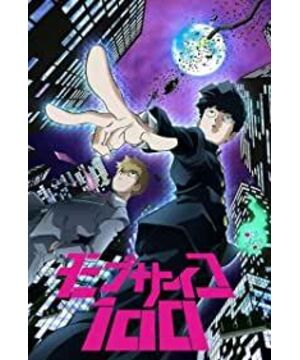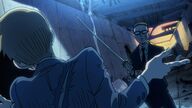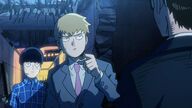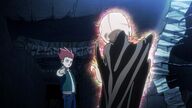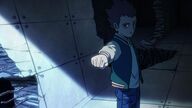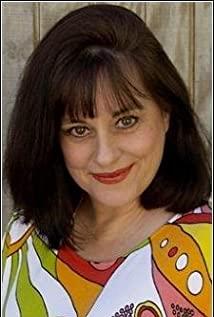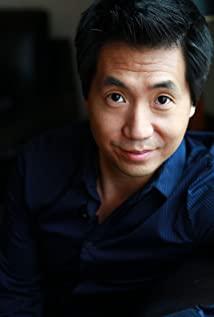"Psionics" hits on a scene that I was particularly curious about when I was a child: what would happen if the villain in the anime and the parents who were busy with work every day met?
I certainly didn't know at the time that there were probably many disputes between doctrines behind it. Of course, now I still can't tell whether this is a deep realism or an invasion of the real world.
First of all, there is a premise for this question, that is, the setting of this anime is based on a daily world. After all, many animes are fantasy from beginning to end, such as Naruto, parents are ninjas, children are ninjas, the whole world The rules are largely the rules of the ninja. Another type of anime based on the daily world is different. In Doraemon, Nobita's mother is a housewife and his father is an office worker; similarly, the configuration of Crayon Shin-chan's house is similar to that of Nobi Nobita's house, with realistic neighborhoods and real people. Of course, in ordinary dramas, some spatial divisions will be set up. For example, Nobita Nobita has an upstairs room with an opaque sliding door so as not to intersect with his parents' world. At the same time, parents are mostly used as a symbol and instrumental elements to serve the narrative. However, when it comes to general mobilization, big events, and big adventures, this kind of big story has to involve the parents as well. Doraemon may not be obvious, but Crayon Shin-chan is more typical: here a group of cosmic people took the small Shin, where a villain wants to destroy the world again, at this time, Hiroshi and Misao can only be forced to start their own adventures.
Second, I found this question amusing as a child, probably revelling in a certain sense of drama. "An umbrella and a sewing machine meet on the operating table" written in the surrealist poems share this sense of drama; the same kind of time-travel dramas and novels make people relish the various experiences after the traveler completes the time-travel. Stun or stun. Lifeforms from two completely different worlds have encountered each other. They have their own very different pasts and ambitions. How the plot develops next is what inspires people's curiosity and imagination the most. One of the endings that I liked about brain supplements at the time was: ignoring or invalidating, that is, using the parents' life world and work world to eliminate the villain's ambitions. For example: "Hey, are you annoying? I have to go to work if you don't go to work. It's weird!" While speaking, the weirdo was put aside, and the weirdo had no choice but to be left aside. But this idea was later abandoned by me, because I had a dream, in which I was chased by a blue-skinned elephant spirit, I ran to the bedroom to ask my parents for help, they were indifferent, so I had to hide by myself chase. After this dream, things turned into a case-by-case discussion: when I was a bystander, I could allow my parents to declare the anime villains null and void in the name of the everyday world. But when I'm in the villain's world and the villain's logic, I desperately want their help - although I don't know if the briefcase can block the heat rays.
"Declared void" is worth mentioning. It reminds me of another one of one's work, "One Punch Man", where the protagonist Saitama solves any weirdo with one punch. Through the shell of juvenile fighting monsters, we found that Saitama-sensei's attitude towards monsters is actually very similar to the attitude of parents in the ending of my brain supplement above (indifference, impatience), but the parents use ignorance or ineffectiveness to "fight" monsters , and Saitama just visualized it with "invincible". In essence, the parent/Saitama and the villain/weird are in different "worlds" and different "dimensions", and the villain's energy simply "cannot get out of the circle" and cannot penetrate the "dimensional wall" of the adult world, once the villain is destroyed If the world and the purpose of enslaving human beings cannot be achieved, they will naturally be greeted by eternal failure. Under this interpretation, Mr. Saitama's invincibility does not come from exercising, nor does it have anything to do with the "god" in the mouth of the wandering emperor. He just "grown up", so he is not in the same dimension as weirdos and heroes. ; How could his ordinary punches, that is, cross-dimensional dimensionality reduction strikes, not kill him in seconds. As for why Saitama can touch another dimension, just like the person who walked out of the cave and returned to the cave in the cave fable, the setting of one is also intriguing: because Saitama's work hit a wall everywhere, he finally left the "adult world" and became a person living in a deserted place. The marginalized people in the district, "heroes driven by interest" sound full of idealism at first glance, but when you think about it carefully, utilitarian and secular purpose considerations such as "making money", "supporting a family", "promotion" and "self-realization" are completely discarded. So Saitama is actually an adult who fell from the adult world to the children's world. Saitama is also a transmigrator, but it is not a transmigrator of the physical body, but a transmigrator of the mentality.
Let's look at another situation where the parents are also involved in the big adventure. This situation is actually very simple, that is, the entire story setting is temporarily or permanently fantasy. After all, a briefcase can't block the heat rays, unless the briefcase is also magically changed into a plasma knight shield - "Only magic can defeat magic", isn't it? Of course, it’s okay to insist on not making changes to the parents, but it will increase the burden of the screenwriter. Either use the information gap to start a wit, or take the black line, the villain conquers the world or something.
Back to the issue of "Psionics", the final battle of Psionics is the classic scene of "ordinary adults facing anime superpower villains". Mr. Xinlong's mouth escaped for a while, and it was okay to scare the minions, but in front of the superpowers with absolute strength, he could only compete with the psionic power of his apprentice Shigeo Kageyama. But this "borrowing" is subtle. Middle school student Ying Shan can't control the psionic energy of the runaway very well, just like he can't control his own emotions well, and Teacher Xinlong is an adult, he is mature, optimistic, and Steady, not only can control this part of the psionic energy, but also improve it from 100% to 1000% level. Therefore, it is good that the final victory is partly attributed to "psionic energy", but the other part is more critical, it should be attributed to the "adult" attribute of Teacher Xinlong, which transforms the rampage and psychologically destroys or Said to educate the villain.
At this point, I think the core problem is obvious. Behind the "parents encounter anime villains" is actually the struggle between the adult world and the middle and second world, the three-dimensional and the two-dimensional, reality and fantasy. The stance of Psionics is very clear:
"People are people, no matter how special abilities they have. Nothing else."
"I rely too much on my own special abilities, so my vision becomes narrow. I have never seen the world, but want to conquer the world?"
"First take off your childish shoulder pads and become an adult! You too, are you just trying to escape this society?"
"If you want to mature, just live in reality!"
"Who do you think of yourself? You are a commoner! You are a commoner, a part of the public!"
It can be said that in this passage of Mr. Xinlong's speech, there is not only an encouragement to persuade all the houses to abandon the darkness and return to the light, and re-enter the torrent of life, but even a spirit of enlightenment that calls for equality. Are the two related, devotion to life and the mentality of the common people, escapism and honeyed self-confidence? I think it's related: escaping the larger, more realistic world, relegating to an involute life-form, and then enchanting that life-form, leading to self-indulgence and a series of implicit and explicit contempt Chains, a vague sense of superiority, and finally a vicious circle, hopeless - isn't this a "naive shoulder pad"? In "One Punch Man", one directly drew this kind of human mutation into a weirdo, and then was solved by Saitama with one punch.
View more about Mob Psycho 100 reviews


